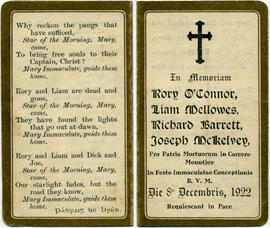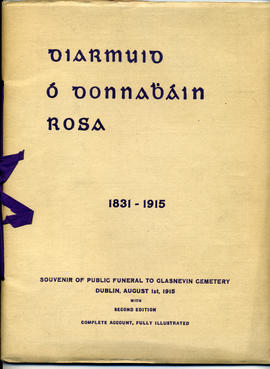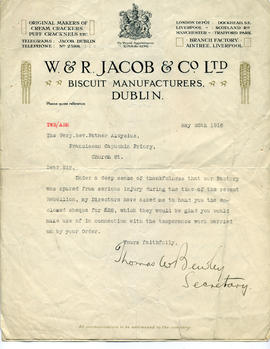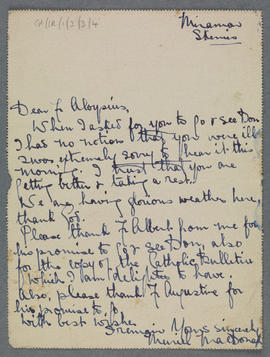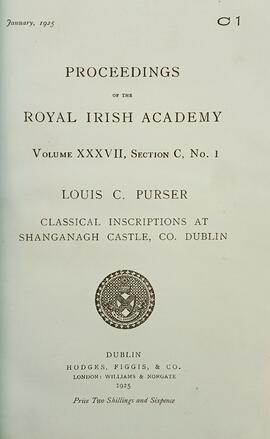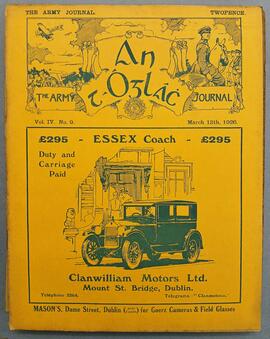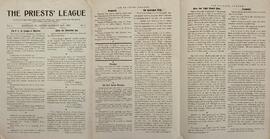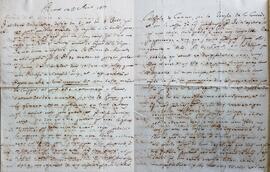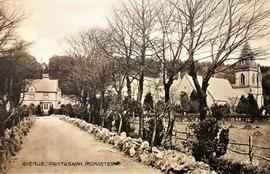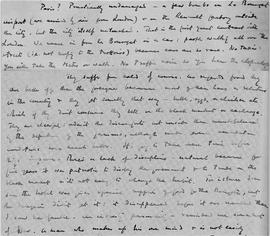‘In Memoriam Rory O’Connor, Liam Mellows, Richard Barrett, Joseph McKelvey, died 8 Dec. 1922’
Souvenir publication for the funeral of O’Donovan Rossa at Glasnevin Cemetery, Dublin, 1 Aug. 1915. 2nd edition. Includes the text of Pearse’s graveside oration and other contributions by Thomas Mac Donagh, Seamus O’Sullivan, and James Connolly’s statement on The Citizen Army.
Correspondence between Thomas W. Bewley, secretary, W. & R. Jacob & Co. Ltd., and Fr. Aloysius Travers OFM Cap. regarding a cheque for £25 given by the directors of Jacobs to the Capuchins as a mark of appreciation ‘for the deep sense of thankfulness that our Factory was spared from serious injury during the time of the recent rebellion’. Includes a copy reply from Fr. Aloysius returning the said cheque. He writes ‘Any services that I may have rendered during the recent sad crisis were such as … any other priest in the same circumstances would render’. Fr. Aloysius suggests that the cheque should more fittingly be sent to the Lord Mayor’s Fund for the Relief of Distress.
She expresses her regret on hearing of Fr. Aloysius’s recent illness. She wrote: ‘When I asked for you to go and see [her son] Don I had no notion that you were ill …’. She added ‘Please thank Fr. Albert from me and his promise to go and see Don, also for the copy of the Catholic Bulletin which I am delighted to have’. With photographic postcard print of ‘Donagh and Barbara MacDonagh children of Thomas MacDonagh, shot at Kilmainham, May 3rd 1916’.
A bound volume of selected editions of the ‘Proceedings of the Royal Irish Academy’. The spine has a gilt title which reads ‘Pamphlets / B 6’. The editions mostly comprise academic papers on various Irish antiquities and monuments and assessments of historical sources. The topics include ‘A calendar of the Register of Archbishop Fleming’ (1912), ‘Four brooches in the library of Trinity College Dublin’ (1915), ‘Classical inscriptions at Shanganagh Castle, County Dublin’ (1925), and ‘The Diocese of Ross and its ancient churches’ (1932). The editions were published by Hodges Figgis & Company in Dublin.
A file of editions of ‘An t-Óglách / The Army Journal’ from January 1926 to December 1926. Some of the issues include articles assessing the 1916 Rising.
A copy of a flier titled the ‘Priests’ League’ (Vol. 1, No. 1, 1908). The flier was printed issued in Scottdale, Pennsylvania, and was most likely issued by a local branch of the Catholic Total Abstinence Union of America.
A file of letters from Cardinal Ercole Consalvi, a senior official in the Roman Curia. All the letters are written from Rome. One letter is dated 6 September 1801 with the remaining four seemingly dating from May to August 1817. The letters are unsigned and a few may be incomplete. With a covering envelope annotated ‘Consalvi’.
Two postcard prints captioned ‘St. Mary’s Abbey, Quarr – General View by Moonlight’ and ‘Avenue, Pantasaph [Capuchin] Monastery’. Cards printed by ‘Valentine’s’ and ‘D.A.L., printing’.
Draft poetry by Daniel Laurence Kelleher (1883-1958) submitted for publication in 'The Capuchin Annual'. The file includes drafts of ‘Nietzsche’ (1924), ‘The forties of the Twentieth Century’, ‘Marie, do you remember?’, ‘Resurrection Morn’, ‘Question Mark’, ‘Travellers’ Tales’, ‘The Medallist’, ‘Loneliness’, ‘Decadence’, ‘Thistle’, ‘Return to Ireland, 1928’, ‘Sappho Spoke Our Name’, and ‘Three Thoughts for 1936’. The file also includes correspondence, draft articles, notes and newspaper articles written by Kelleher. Many of the drafts of stories are seemingly connected with Kelleher’s work for the Irish Tourist Association. Many relate to important historic personages associated with places around Ireland particularly in Dublin including Belvedere House, St. Stephen’s Green, Werburgh Street, Meath Street, Parnell Square, O’Connell Street, the Guinness Brewery and Dublin Castle. Other locations referred to include ‘Armagh City – First Impressions’ published in 'The Capuchin Annual' (1943), Limerick, Tory Island and Lough Derg. Many of the stories are written in a travelogue style and some may have been written with a view to publication in the 'Annual'. The correspondents include the Government Information Bureau, Fr. James O’Mahony OFM Cap., T.J. Kiernan, Frank Flynn, the Irish Tourist Association. The file includes the following items:
• Clipping from the 'Evening Telegraph' (2 Oct. 1915) of an article by Kelleher titled ‘The Colour of Cork’.
• Clipping of an article titled ‘A Picture of Dublin’. (1928).
• A story titled ‘Sir Kay the Senechal’.
• Draft story titled ‘Father was always like that’.
• An article titled ‘Adventures in Europe / The Great St. Bernard Monastery’.
• Letters to Kelleher from Edward J. Phelan (1888-1967), the Director-General of the International Labour Organisation from 1941-8. Phelan’s letters date from 19 Feb. 1927 to 8 Jan. 1956. One of the letters (24 Dec. 1945) gives an eye-witness account of conditions in post-war Paris. See image of letter extract which reads:
‘Paris? Practically undamaged – a few bombs on Le Bourget airport (we arrived by air from London) and on the Renault factory outside the city, but the city itself untouched. That is the first great contrast with London. We came in from Le Bourget in a car: people walking all over the streets (i.e. not keeping to the trottoirs) because cars are so rare. No taxis: you either take the metro or walk. No traffic noise so you hear the clop-clop.
They suffer from cold of course. As regards food they are better off than the foreigner because most of them have a relative in the country and they get something that way – butter, eggs, a chicken etc which if they don’t consume they sell on the black market in exchange. They are cheerful; admit the discomforts but consider them counterbalanced by the departure of the Germans, although under German occupation conditions were much better. It’s going to take some time before things improve. There’s a lack of discipline – natural because for five years it was [a] patriotic duty to disobey the government and to trade on the black market and its not easy to change the habit. For instance I am sure the hotel was given special supplies of food for the delegates, but the delegates didn’t get it; it disappeared before it ever reached them. I saw de Gaulle. An interesting personality – reminded me somewhat of Dev [Éamon de Valera]: a man who makes up his own mind and is not easily [shifted when he has]'.

